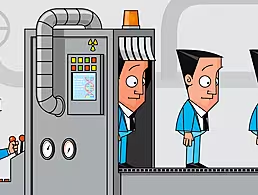Talking about being busy at work or having a stressful week has almost become a badge of honour, writes Jenny Darmody.
How often do you reply to the question, ‘How was work?’ with the word ‘busy’? When did that suddenly become the norm?
Having written about work-life balance, switching off and burning out, I’ve become more aware of my own work habits, and one in particular bothers me above others.
When people ask me how work is going, my answer is invariably: ‘Busy.’
I say the word ‘busy’ without a second thought. It has become my go-to answer. It has surpassed the word ‘good’ or even ‘fine’.
Having run this past a good few people, I have realised that I’m not alone. And it’s only through listening to Dropbox’s Adrienne Gormley discuss the toxicity of the word ‘productivity’ or Arianna Huffington speak out about collapsing from sleep deprivation that I realised the phenomenon of being busy for the sake of being busy is a huge societal problem.
And it’s killing us.
Keeping up with the stress of life
I spoke to sports psychologist Gerry Hussey earlier this year about how to deal with imposter syndrome, a feeling that often goes hand in hand with stress.
He told me that we now have a generation that is cortisol-driven and dopamine-starved. Science tells us that cortisol is a good thing in short bursts. It has a function, it’s there to heighten our awareness to danger and trigger a ‘fight or flight’ response. In small amounts, it keeps us on edge, making us eager to learn and improve. But, in a cortisol-driven world, this leads to intense stress, anxiety and burnout.
The trouble is, the world is working harder and faster, and fighting for maximum productivity. This creates a cycle of needing to feel busy all the time in order to feel productive at work.
“The word ‘busy’ is emotionally loaded, so every time you say to yourself, ‘I’m busy’, it creates stress,” Hussey told me. “We’re constantly using words that really stress us out. The words we use become the house that we live in.”
Not only do people innocently play into their own stress and ‘busyness’, but society is encouraging people to stay tired and stressed because these are problems that can be seemingly treated with quick fixes.
“We live in a world with so many people ready to treat your symptoms,” said Hussey. “People want to sell you a tablet for your headache, a coffee for your tiredness, a yoga class to help you deal with the stress of life.”
How busy are you really?
As society and the working world have become faster, particularly with developing technology, it seems to have become less acceptable to say you didn’t do much today.
If you’re not at your most productive all day every day in work, you’re probably not being the best you can be, right? That has certainly become the feeling among employees around the world.
The Japanese have a special word for death by overwork and, sadly, one of the most recent cases of karoshi happened just last month.
Experts around the world praised France for its decision to put the right to ‘switch off’ into legislation to encourage people not to work outside of office hours.
It’s no wonder then that in this world, we are conditioned to always consider ourselves busy and to believe that this is a good thing. But how busy are you really?
How much time do you spend doing productive work compared to the time in which you are simply ‘busy being busy’?
“There’s 60 seconds in a minute. That has never changed. Time is time. The world isn’t moving any faster,” Hussey said. “The world has not become fast-paced and unstable, our minds have become fast-paced and unstable.
“We say we haven’t time. But we have time for Twitter. We’ve time for Instagram.”
‘If you’re willing to hang off a cliff for three minutes, you will soon realise that time is not moving that fast. In fact, time is bloody slow’
– GERRY HUSSEY
Suddenly, trying to add up the amount of time you spend actually doing things is very difficult. There’s 168 hours in any given week. If you average 50 hours of work and 40 hours sleeping, that’s only 90 hours you can account for. Can you figure out what you spend the other 80 hours doing?
“People have to stop saying I don’t have enough time,” said Hussey. “If you’re willing to hang off a cliff for three minutes, you will soon realise that time is not moving that fast. In fact, time is bloody slow.”
The power of words
It’s no secret that words carry power. Merely thinking about the word ‘stress’ can make you more stressed.
“Every word you say is emotionally loaded. ‘I’m busy. I’m stressed. I’ve a big meeting.’ How big is the meeting? Is it going to be four football pitches wide?” asked Hussey.
Even the word ‘deadline’ is an emotionally powerful word with negative connotations, as well as the phrase ‘panic attack’. “People who suffer from anxiety shouldn’t have to say ‘panic attack’.”
A good start for those trapped in the ‘busy bee’ mentality is to challenge yourselves not to say any of those things for one whole week.
Being stressed and being busy doesn’t have to be the norm. We shouldn’t accept it as a way of life.
Luckily, there is some pushback from younger generations. Some of the biggest influencers in the world of work agree that millennials should be praised for the difference they’re making, simply by saying no to an unhealthy work-life balance.
By demanding a work environment that offers them wellness, looks after them and cares about their lives outside of work, they are changing the narrative that one must be extremely busy and stressed all the time in order to be productive.
It’s time the rest of the workforce joined them.




